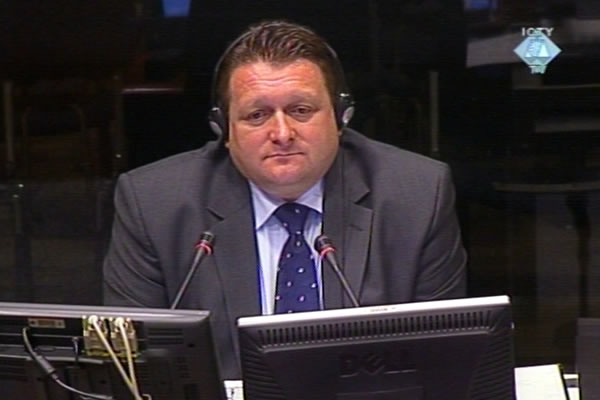Home
VITEZ DEFENDS MARKAC
Drazen Vitez, former assistant commander of the Varazdin special police, contends that his men followed General Mladen Markac’s instructions to respect the international law of war during Operation Storm and did not commit any crimes. The witness described the accused as a ‘determined, responsible and highly respected police officer’
 Dražen Vitez, svjedok odbrane Mladena Markača
Dražen Vitez, svjedok odbrane Mladena Markača Testifying in Mladen Markac’s defense, Drazen Vitez, former assistant commander of the Varazdin special police, described the movements of his unit – 140 strong – in Operation Storm. In his May 2009 statement to the defense, Vitez claimed that the special police from Varazdin launched the attack on 4 August 1995 from the Velebit Mountain. Three days later, Vitez described, they reached the BH border and then returned to Varazdin. As alleged in the indictment against generals Gotovina, Cermak and Markac, during and after Operation Storm, crimes were committed against Serbs and their property; the objective was to ethnically cleanse Krajina. The witness denied that the special police took part in those crimes.
Vitez contends that the commanding officers met with the special police commander Mladen Markac on 3 August 1995 in the town of Starigrad. Markac gave them their tasks, assigned axes, and shared with them the intelligence about the strength and disposition of the enemy forces. According to the witness, Markac focused in particular on the need to respect the international law of war: both civilians and prisoners of war were to be treated according to the law. Immediately before the attack, strict instructions of the special police commander were passed on to all police officers from Varazdin.
As far as the witness knew, the special police respected Markac’s instructions and didn’t commit any crimes in the course of their involvement in the war. On 7 August 1995, the witness passed through Gracac. He claims he didn’t see any damage to the houses. Some houses were overgrown with bushes and the witness concluded that they had been destroyed much earlier. Continuing their advance towards the border, the special police entered the village of Mazin. There they found some elderly Serbs and explained to them that they should stay there and wait. The general-duty police that were to arrive soon would help them, Vitez’s men told them.
The witness saw the first burned down houses – not more than two or three – when he arrived in Donji Lapac on 7 August 1995. The next night, the small town in Lika was burned to the ground, the prosecution alleges. His unit spent the night there and no special police took part in any crimes, Vitez said. Some previous witnesses called by General Markac blamed the HV Gospic Military District units for the destruction of Donji Lapac. Those units were in Donji Lapac at the same time.
As his examination-in chief drew to a close, Vitez was asked to say few words about his colleague Mladen Markac, with whom he had worked for long years. Vitez described Markac as a responsible and determined worker. There wasn’t a task that Markac wouldn’t complete. This is why, Vitez continued, Markac was a ‘highly respected general’ even outside the police ranks.
Former assistant to the Croatian interior minister Josko Moric completed his evidence today before Vitez took the stand. As he left the courtroom, Moric thanked the judges and the Tribunal’s personnel who took care of him, saying he arrived in The Hague with ‘some prejudice, but was leaving the prejudice behind now.
Linked Reports
- Case : Gotovina et al. - "Operation Storm"
- 2009-12-08 SKABRNJA AS ‘EXAMPLE’ FOR CROATIAN VILLAGES IN KRAJINA
- 2009-12-01 POLICEMAN BLAMES THE ARMY
- 2009-11-30 WHO KILLED THE OLD PEOPLE IN GRUBORI?
- 2009-12-10 GOTOVINA AND MARKAC REFUSED TO ENTER COURT
- 2009-12-11 GOTOVINA AND MARKAC VERSUS THE REPUBLIC OF CROATIA
- 2009-12-16 ‘ACCOUNTANCY HEARING’ ABOUT ARTILLERY DOCUMENTS
